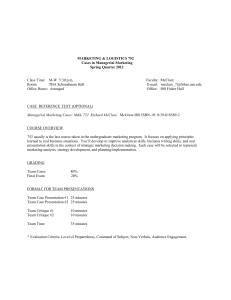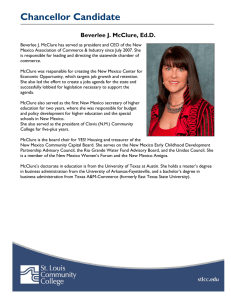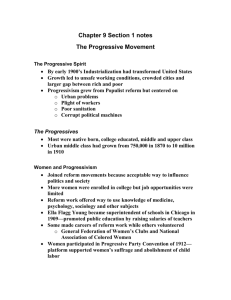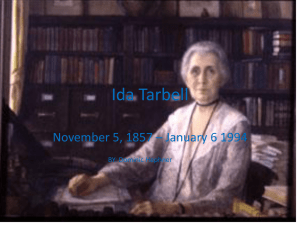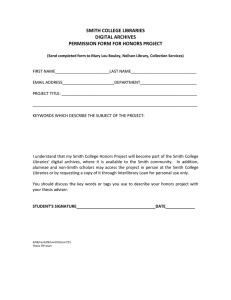Smith College Alumnae Oral History Project Karen McClure, Class of 1961
advertisement
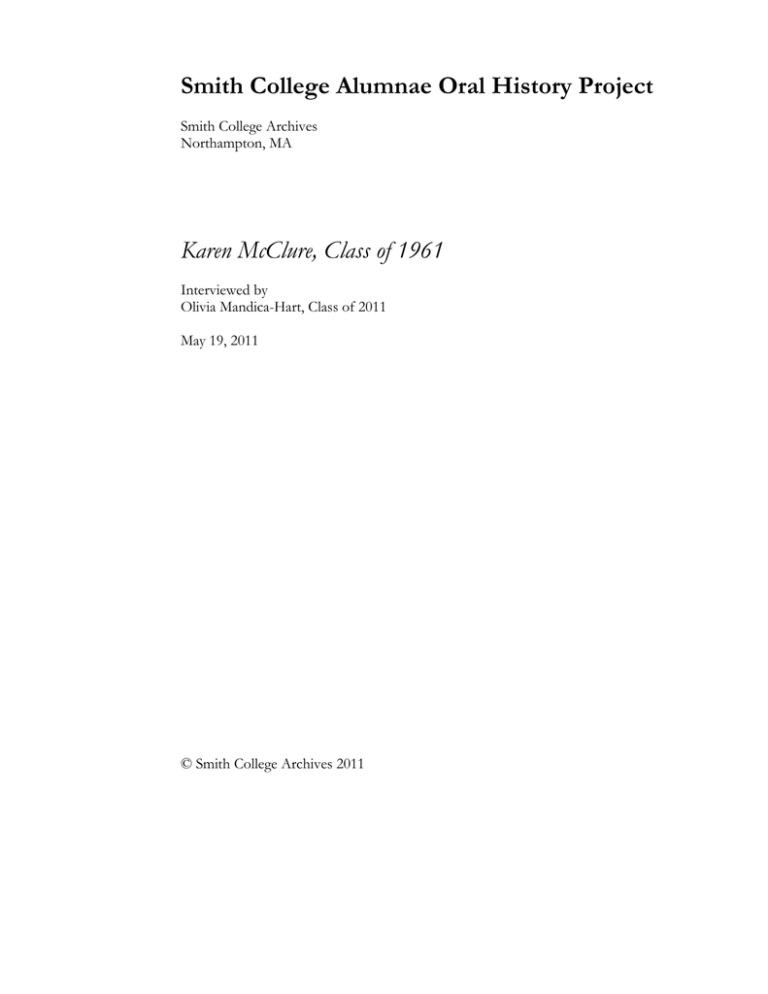
Smith College Alumnae Oral History Project Smith College Archives Northampton, MA Karen McClure, Class of 1961 Interviewed by Olivia Mandica-Hart, Class of 2011 May 19, 2011 © Smith College Archives 2011 Abstract In this oral history, Karen McClure describes the overall campus atmosphere, her involvement in sports, her work as a sociology major, issues of diversity, the dating scene, her experiences living in Wesley House, and what it feels like to be back at Smith. Restrictions None Format Interview recorded on miniDV tapes using a Panasonic DVX-100A camera. One 60-minute tape. Transcript Transcribed by Matthew Skelton at the Audio Transcription Center in Boston, Massachusetts. Audited for accuracy and edited for clarity by Olivia Mandica-Hart. Bibliography and Footnote Citation Forms Video Recording Bibliography: McClure, Karen. Interview by Olivia Mandica-Hart. Video recording, May 19, 2011. Smith College Alumnae Oral History Project, Smith College Archives. Footnote: Karen McClure, interview by Olivia Mandica-Hart, video recording, May 19, 2011, Smith College Alumnae Oral History Project, Smith College Archives, tape 1. Transcript Bibliography: McClure, Karen. Interview by Olivia Mandica-Hart. Transcript of video recording, May 19, 2011. Smith College Alumnae Oral History Project, Smith College Archives. Footnote: Karen McClure, interview by Olivia Mandica-Hart, transcript of video recording, May 19, 2011, Smith College Alumnae Oral History Project, Smith College Archives, p. 3. Karen McClure, interviewed by Olivia Mandica-Hart 1 Smith College Alumnae Oral History Project Smith College Archives Northampton, MA Transcript of interview conducted May 19th, 2011, with: KAREN MCCLURE by: filmed by: OLIVIA MANDICA-HART KATE GEIS MANDICA-HART: OK, so this is Olivia Mandica-Hart and Karen McClure, class of 1961. The date is May 19th, 2011, and we are in the Alumnae Gymnasium at Smith College in Northampton, Massachusetts. GEIS: Can you have her spell her name, too? MANDICA-HART: OK, have her spell her name? Could you please spell your name, just for the record? MCCLURE: K-A-R-E-N M-C-C-L-U-R-E. MANDICA-HART: Thank you. OK, so let’s just start off: why did you choose to come to Smith? MCCLURE: Good question. My family was from the East, and I grew up on the Gulf Coast, and I wanted to go away to college, but I also wanted to go back to where I had some roots that I wasn’t real familiar with, and my aunt, who wasn’t much older than I, had gone to Smith, and she was the apple of my eye, so– MANDICA-HART: So other women in your family had gone to– MCCLURE: Other women in my family, yeah. MANDICA-HART: And so where specifically, what state were you from originally? MCCLURE: Originally Pennsylvania. MANDICA-HART: Pennsylvania. And then where were you living when you decided to come to Smith? MCCLURE: When I came to Smith I was living in New Orleans. MANDICA-HART: New Orleans. So was Massachusetts different for you, or you’d been in—you’d been on the East, so was it a shock, or–? Smith College Alumnae Oral History Project Smith College Archives Karen McClure, interviewed by Olivia Mandica-Hart MCCLURE: 2 It was a shock in some ways. I had never been to this part of the country before, except to visit Smith, and I liked what I saw when I visited, and I loved the Gold Key guide. MANDICA-HART: Oh, yes. MCCLURE: But the cold weather was an adjustment. MANDICA-HART: So how would you describe the campus atmosphere during your time here? MCCLURE: It was still a very traditional place. The atmosphere was welcoming. I loved it. I stayed all four years. But the ’60s hadn’t materialized yet, and so it was still very much as it had been, I think, for quite a while. We had rule and regulations and posture pictures, (laughter) and a lot of things fell by the wayside shortly after I left. MANDICA-HART: So what were some of the rules and regulations you, that–? Do any stick out in your mind, or–? MCCLURE: None of them bothered me, really. We had curfews, and I was used to having a curfew, and we had limited class cuts, and I didn’t plan to cut at all, so that was not an issue. But it did bother some people. Of course, we could have no men on the upper floors of the house, not even your father was announced with great fanfare, much to his amusement. He would come for what was then Father’s Weekend—I think it’s now Parents’ Weekend. MANDICA-HART: Yes. So how would you describe a typical Smith student when you were here? MCCLURE: Very athletic. Very physically active, which is one thing that appealed to me. It seemed that the alumnae I had met were doers, as well as being very intelligent and studious. MANDICA-HART: So were you a member of any clubs or organizations? You mentioned athletics. Did you play any sports? MCCLURE: Not competitively. I took up field hockey, which I had had the opportunity for at the private school I went to in Houston, but that was an anomaly. It was unheard of, for the most part, in the South. So I pursued that, and I joined the Mountain Club right away and went on some trips with them, and I’m still into that where I live in Colorado. MANDICA-HART: So that—how did that shape your experience here? Was that a big part of your friend group, or–? Smith College Alumnae Oral History Project Smith College Archives Karen McClure, interviewed by Olivia Mandica-Hart MCCLURE: 3 Well, I saw natural areas in the East that I probably wouldn’t have seen otherwise, and I enjoyed the people I met. MANDICA-HART: So what was your major? MCCLURE: I ended up in sociology, because it allowed me the most latitude in what courses I chose. One thing we still had then were distribution requirements, and then when you got into your major you really focused on that subject, and I wasn’t ready to focus on anything in great depth. So by majoring in soc. I could take American art and American intellectual history and studio art, and it all counted. I don’t know how that happened, (laughter) but it all counted toward my major. MANDICA-HART: So did any professors or mentors inspire you or you were particularly close to? MCCLURE: Ms. (Nieders?) was the Dean of our class, and we became very close, even though I never took German, and there was an anthropology professor, a gentleman—I can’t remember his name, unfortunately—but that was a whole new subject for me. And I loved him because he had us write a lot, and then he would read all of that, and he would make suggestions as to how he maybe could phrase it more precisely. So I learned as much about composition and writing as I did about anthropology. MANDICA-HART: Did you have any experiences with relationships or dating when you were here? MCCLURE: Experience? Yes! (laughter) But I’d been in a coed situation up until Smith, and I found it rather artificial and stilted and– I often was very glad for the curfew! (laughter) MANDICA-HART: (laughter) So were you involved with activism of any kind? You said it was sort of before– MCCLURE: It was before that was the vogue, and no, I wasn’t. MANDICA-HART: Do you remember the controversy of Smith firing professors, Newton Arvin and Edward Spofford and Joel Dorius? It was around that time, I believe. MCCLURE: Was it? I didn’t get involved in that. MANDICA-HART: I don’t remember. MCCLURE: I thought, you know, that’s the College job and not the students’, and– Smith College Alumnae Oral History Project Smith College Archives Karen McClure, interviewed by Olivia Mandica-Hart 4 MANDICA-HART: Right, right. Do you think Smith was an accepting place for minorities or things like that? Was that an issue at the time? MCCLURE: They were just getting into that, and one of my goals coming here was to meet an African-American or–in that time we called them colored people–a colored person of my own ilk, and I did: Florence Mwangi (sp?), Niendo Mwenge (sp?) from Kenya. She was not AfricanAmerican, but she was definitely African. MANDICA-HART: And now the– MCCLURE: And she and I became very close friends. And Hiroko Iramatsu (sp?) from Japan, I was a friend of. And so that was one thing I was looking for in a college was the diversity, and I got a taste of it, anyway. Of course, it’s much more so now. MANDICA-HART: So that was something you were specifically looking for when you came here. You hadn’t had much experience interacting with other races before you got here, or–? MCCLURE: Not on my own intellectual level. MANDICA-HART: So what did you expect as a Smith graduate when you were done in 1961? What were your expectations for yourself? MCCLURE: I expected to work, to have my own profession, and I have. MANDICA-HART: Would you like to tell us about it a little more? MCCLURE: Well, I’ve really had three careers. The first was in environmental education, right out of Smith. I got married immediately and moved West, and set up education programs in a zoo and in a nature center, and then I taught in yet a third one, and then I consider motherhood and wifedom a career, and I did that for twenty-some odd years. I’m on a 20 year cycle, 20, 20, 20. And then when I became single again I established a real estate company and sold residential real estate. MANDICA-HART: And so do you feel as though your parents or your family had expectations for you, as well, when you graduated? MCCLURE: To do what I wanted to do. MANDICA-HART: That’s great. And has your life after Smith strayed from your original plan, or–? No, because you said you wanted, you accomplished– MCCLURE: No. Smith College Alumnae Oral History Project Smith College Archives Karen McClure, interviewed by Olivia Mandica-Hart 5 MANDICA-HART: So looking back, would you encourage your daughter, if you do—I don’t know if you do, or– MCCLURE: I do have a daughter. MANDICA-HART: And would you encourage her to go to Smith, or did you? MCCLURE: Well, I would’ve been very happy if she had, but she wanted to go to a large, state university. She hadn’t had the public school experience, and she wanted what she called a real world experience. And after it was all said and done she said, “You know, I ended up palling around with the same kind of person I did in high school.” But she had to do it to find that out. MANDICA-HART: Right. So looking back, would you still come to Smith again? MCCLURE: I probably would go to a coed school. I probably would. But that’s not to say I don’t treasure the Smith experience, because it was unique among all others, and I wouldn’t trade it for anything, but if I could do it again I’d probably go to Dartmouth or Williams or– Yeah. MANDICA-HART: You said that the dating scene was kind of stunted, but were there— there were dances and things like that with other–? MCCLURE: There were mixers. MANDICA-HART: Mixers. MCCLURE: Which I found terribly awkward. MANDICA-HART: Yeah, too forced. MCCLURE: Yeah. MANDICA-HART: Right. So what difference has a Smith education meant to you? MCCLURE: Well, it’s interesting: in the West a lot of people haven’t even heard of Smith, so it maybe doesn’t carry the same weight as it might on the East Coast, but I got out of Smith what I needed, which was to learn how to read and write and think, with tremendous facility. And I’m really grateful for that. MANDICA-HART: So do you have any idea in your head of what you think a typical Smith student today is like? MCCLURE: I doubt if I’d recognize her. MANDICA-HART: Yeah, very different. Smith College Alumnae Oral History Project Smith College Archives Karen McClure, interviewed by Olivia Mandica-Hart MCCLURE: 6 Very different. That’s not to say it’s not as good or any less valid, but probably very different. MANDICA-HART: In what ways do you think different? MCCLURE: Probably far more liberal than we were as a group, with far more options, but that’s just a guess, really. I would like to come back to Smith and spend a semester and take Art 101 and Gov 101 and History 101, et cetera, and settle in with the students and really get acquainted. MANDICA-HART: Well, I think you should do it, because I think they would love you! MCCLURE: (laughter) Is that possible? Has anyone ever done that? MANDICA-HART: I’m sure that—I’m sure you could get them to let you. I think that would be great. So you say more liberal because it seems like politics was not discussed a lot when you were here, or–? MCCLURE: Well, I was very aware that many of my professors had different views than my family did, and that was good to be exposed to another way of thinking. I can remember there was one professor, Mr. Ruiz, who swore up and down that Castro was not Communist, and in the process of proving that to us, why, he gave us tremendous insight into that culture and that personality. I think history has proven him wrong. MANDICA-HART: (laughter) So do you have any advice for current and future Smith students, anything you’d like to tell them? MCCLURE: Current and future Smith students. Well, get as much out of it as you can, because it’s a unique four years, and it only happens once. Go to the lectures, go to the concerts, go to the– Just soak it up, because it’s a wonderful smorgasbord of opportunities, probably still is. MANDICA-HART: Right. Did you go to a lot of events when you were here? MCCLURE: I did. MANDICA-HART: I was looking through the old newspaper and there seemed like there were some great concerts and lectures and everything. MCCLURE: Are there still? MANDICA-HART: Yes, there are, but I was a little jealous about some of the things I was seeing in the paper. Great. Is there anything you’d like to add or share, something you think I didn’t touch upon that you’d like to talk about, or–? Smith College Alumnae Oral History Project Smith College Archives Karen McClure, interviewed by Olivia Mandica-Hart MCCLURE: 7 Well, of course, I’d love to hear your ideas about Smith, but that’s not the subject of this! (laughter) MANDICA-HART: Maybe after. I do realize I didn’t ask you what house that you lived in. That’s an important– MCCLURE: I started in Wesley House– MANDICA-HART: Wesley. MCCLURE: –which was a tiny little house, very near Haven, and my roommate was from Northampton, which I considered a huge plus, and we’re still in touch. We ate our meals in Haven, which is where my aunt had lived, so that was a thrill, and then my class in Haven kind of disintegrated after the first couple of years, and I moved to Tyler House, which was real unusual then, to transfer to another house, but then I had a whole new batch of friends in Tyler House. MANDICA-HART: So you’re glad you made the (inaudible)? MCCLURE: So it worked out well, yeah. MANDICA-HART: So your roommate from Northampton, did she help you–? I don’t know, how were relations between the college and the town at the time? Did you–? Was there a lot of overlap, or did you feel like it was fairly isolated from the town? MCCLURE: That’s a good question. I don’t know that I was conscious of it one way or another. My roommate was Sabra Sullivan; she’s now Sabra Anderson. And I can remember the first night we studied together. She was starting Russian, and she was propped up on her bed making all these strange sounds, you know. (laughter) MANDICA-HART: So you’re still in touch. MCCLURE: We’re still in touch, yeah. MANDICA-HART: That’s great. GEIS: I just have one question: When you come back to the campus now, what does it spark in you, being here? Do you have a feeling of your life when you were here as a young woman, kind of where you were going to be going in your life? What does it bring out for you, just walking around here and seeing old friends? MCCLURE: Well, it seems like I never left. GEIS: Look at Olivia. Smith College Alumnae Oral History Project Smith College Archives Karen McClure, interviewed by Olivia Mandica-Hart MCCLURE: 8 The buildings, many of them are still the same, and it feels very comfortable and very special, because you do so much growing during those four years, so much maturing. And it’s very intense, because you’re living here. It’s residential. MANDICA-HART: So you feel like it’s still your Smith. MCCLURE: It’s still my Smith, yes, maybe even better. (laughter) GEIS: And does it—because we’re often in a reflective place when we come back to a place that we’ve been in many years before—what does it bring up for you in terms of looking back at your life and just thinking about the expectations you had for yourself and what you wanted for your education and where you are in your life now, what kind of—if you’re looking back at the spectrum, how do you feel about what you got out of Smith, and then also just sort of where you went in your life? Is it sort of—are these—if you were a student, say you were kind of talking back to yourself at that younger age, what would you—would you give yourself any advice from that perspective? MCCLURE: I would say relax. Don’t worry about it. Stay well. MANDICA-HART: That’s good advice, because Smith students tend to not relax a lot, so– (laughter) Yeah. MCCLURE: Yeah. Yeah. Have confidence, which as a freshman I didn’t have enough. There was no hesitation in coming, but then I got here and I thought, oh dear, this is so different. MANDICA-HART: But do you feel like by the time you– MCCLURE: Tough! (laughter) MANDICA-HART: –by the time you graduated that was different, though? MCCLURE: Oh, yes. Oh, yes. MANDICA-HART: Great. GEIS: Thank you. MANDICA-HART: Thank you very much. MCCLURE: Thank you. It’s been fun. Smith College Alumnae Oral History Project Smith College Archives Karen McClure, interviewed by Olivia Mandica-Hart 9 END OF INTERVIEW Transcribed by Matthew Skelton, July 2011. Smith College Alumnae Oral History Project Smith College Archives
